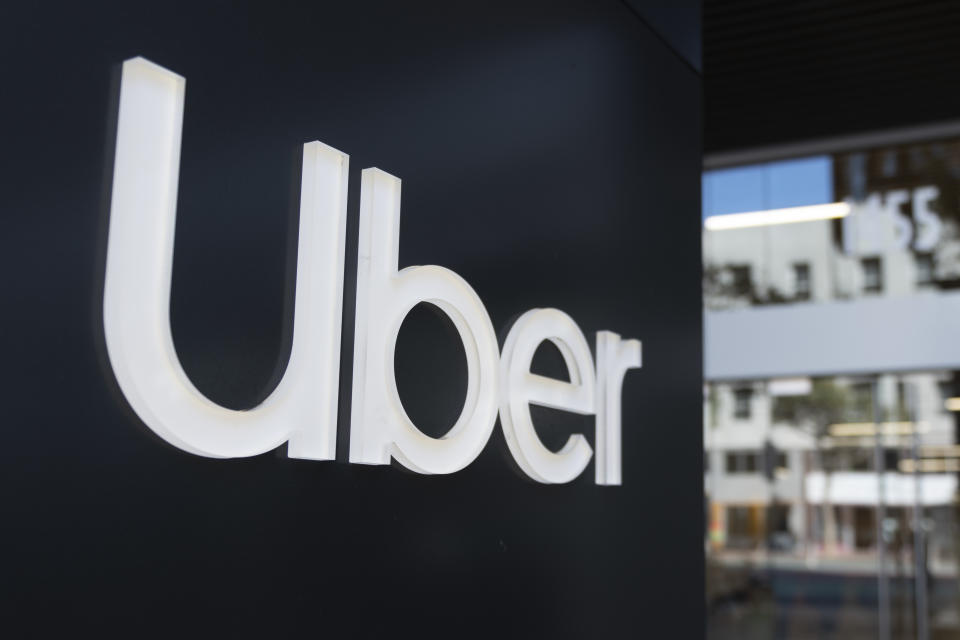Uber reports narrower-than-expected 3Q loss, but user growth comes up short
Uber (UBER) reported a narrower-than-expected loss and estimates-topping revenue for its fiscal third-quarter.
However, gross bookings – a closely watched measure of the total amount customers paid to the platform before factoring in drivers’ pay and other fees – came up short of estimates, and fewer new users were added during the period.
Here were the main numbers from the report, compared to consensus expectations compiled by Bloomberg:
Adjusted net revenue: $3.5 billion vs. $3.39 billion expected
Adjusted EBITDA loss: $585 million vs. $805.1 million expected
Gross bookings: $16.47 billion vs. $16.7 billion expected
Ride-share bookings: $12.55 billion vs. $12.51 billion expected
Monthly active platform consumers: 103 million vs. 107 million expected
Shares of Uber declined 4.3% to $29.83 each as of 4:16 p.m. ET after results were released.
One of Uber’s most closely watched and fastest-growing segments underperformed during the quarter. Bookings for UberEats – a segment reflecting a smaller share of overall revenue but faster growth rate than the core ride-sharing business – grew 73% to $3.66 billion, but this came up short of the $3.85 billion anticipated.
Uber’s ride-sharing bookings grew 20% to $12.55 billion, topping expectations.
Sales grew across all of Uber’s geographic segments. Revenue from the U.S. and Canada comprised nearly two-thirds of overall revenue, with sales growing 39% to $2.41 billion. Asia Pacific posted the next-fastest pace of increase rate, up 31% to $345 million.
Uber on Monday also raised guidance for its full-year adjusted EBITDA loss, saying it now expects to lose between $2.8 billion and $2.9 billion for the year. Previously, it guided toward a loss of as much as $3.2 billion.

Uber, the No. 1 ride-hailing giant in the U.S., has seen its stock fall by about 30% through Monday’s close since shares began trading in May. Uncertainty over the path to profitability and concerns over whether the company will be forced to incur costs associated with reclassifying its gig economy drivers as full-time employees have weighed on its stock and that of peer ride-share company Lyft (LYFT).
During a call with reporters Monday, Uber said it expected to turn a profit on an EBITDA basis in 2021, or about the same time Lyft anticipated it would get into the black. In August, Uber said it expected 2019 would be its “peak investment” year, after which losses would come down.
CEO Dara Khosrowshahi added during an analyst call Monday that Rides’ adjusted EBITDA “now more than covers our corporate overhead,” underscoring the improving profitability of its largest business segment.
Eats, on the other hand, has weighed on results as Uber leaned on incentives and promotions to lure customers in a competitive on-demand food delivery app landscape. CFO Nelson Chai noted that about 15% of Eats’ gross bookings made up more than half of Uber’s overall adjusted EBITDA margin loss during the quarter. But Khosrowshahi said he expects that the mature business model for Eats “will have take rates that are significantly higher than the take rates that you see now,” referring to the cut of sales Uber ultimately retains from each delivery.
Uber’s third-quarter earnings results come just before the company’s post-IPO lock-up period expires Wednesday. That day, early investors and employees holding shares will be able to sell their stock for the first time, which could inject further volatility into the stock as billions of dollars worth of shares become eligible for trading.
Last week, Beyond Meat (BYND) – another company that went public in May – saw shares tank more than 20% after its lock-up ended, even after delivering better-than-expected quarterly results and raising full-year guidance.
—
Emily McCormick is a reporter for Yahoo Finance. Follow her on Twitter: @emily_mcck
Read more from Emily:
Jobs report: U.S. economy adds 128,000 jobs in October, smashing expectations
FedEx CEO: ‘Whistling past the graveyard’ on the U.S. consumer belies a broader slowdown
There won’t be ‘billion-dollar beverage brands’ in the future: Iris Nova CEO
Tech companies like Lyft want your money – not ‘your opinion’
Follow Yahoo Finance on Twitter, Facebook, Instagram, Flipboard, LinkedIn, and reddit.